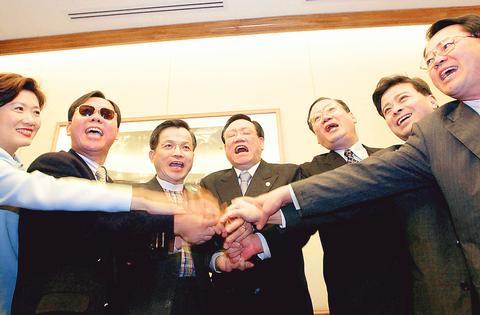The KMT began a push to recall President Chen Shui-bian (
The party's legislative caucus approved a proposal by Legislator Ting Shou-chung (
It did not, however, get the immediate backing of the People First Party (PFP), which prefers to initiate a motion of no confidence against the premier in the legislature.

PHOTO: GEORGE TSORNG, TAIPEI TIMES
The KMT decision came in the wake of a meeting between the caucus representatives of the three opposition parties in an attempt to form an alliance and coordinate their attack on the government.
The meeting reached a consensus on several smaller matters such as changing the agenda of today's legislative session from interpellation of the premier to a review session on the government budget, breaking off communications with the legislative caucus of the DPP and making Premier Chang Chun-hsiung (
The meeting was attended by PFP Legislator Diane Lee (
A statement, which was read by Tseng after the meeting, said that Chang had ridiculed the authority of the legislature by abruptly declaring a halt to the construction of the power plant, without consulting lawmakers.
In accordance with another agreement, Legislative Yuan Speaker Wang Jin-pyng (王金平) did not attend a meeting with the heads of the five branches of government held by the president last night.
At today's legislative session, as well as discussing the review of the 2001 budget, lawmakers are also expected to propose a number of measures aimed at increasing the legislature's authority over the executive branch, including the Law Governing Legislators' Exercise of Power, amendments to the Presidential and Vice Presidential Election and Recall Law (總統副總統選舉罷免法) and the new Budget Law.
The three parties' agreement on less important measures did not help them resolve the central issue preventing concerted action against the Chen-Chang administration, the question of recalling the president or proposing a vote of no confidence in the premier.
The KMT is loath to support a no-confidence motion because if it passes, the president is likely to use his constitutional power to dissolve the legislature and call fresh elections -- in which the KMT is likely to do poorly, to the benefit of the PFP.
In proposing the recall of the president yesterday, Ting said that the re-election of legislators wouldn't help end the current political fiasco, adding that recalling the president was the only solution, otherwise a new legislature would still have to face a dominant president.
The PFP's Lee, on the other hand, said to recall the president would create more social disruption and spoke strongly in favor of the no-confidence vote.
* Vote of no confidence:
- Requires a motion signed by one-third of Legislative Yuan members, and passage needs support from a simple majority.
- If the no-confidence vote passes, the president must nominate a new premier, who then forms a new cabinet, but the president can also dissolve the lawmaking body and call elections.
* Recall of a president:
- Requires a motion from one-fourth of legislators and needs support from two-thirds for passage.
- If the dismissal is approved by lawmakers, a popular referendum is held.
- If over half of the voters approve the dismissal, new elections are held.
Source: Reuters

MAKING WAVES: China’s maritime militia could become a nontraditional threat in war, clogging up shipping lanes to prevent US or Japanese intervention, a report said About 1,900 Chinese ships flying flags of convenience and fishing vessels that participated in China’s military exercises around Taiwan last month and in January last year have been listed for monitoring, Coast Guard Administration (CGA) Deputy Director-General Hsieh Ching-chin (謝慶欽) said yesterday. Following amendments to the Commercial Port Act (商港法) and the Law of Ships (船舶法) last month, the CGA can designate possible berthing areas or deny ports of call for vessels suspected of loitering around areas where undersea cables can be accessed, Oceans Affairs Council Minister Kuan Bi-ling (管碧玲) said. The list of suspected ships, originally 300, had risen to about

DAREDEVIL: Honnold said it had always been a dream of his to climb Taipei 101, while a Netflix producer said the skyscraper was ‘a real icon of this country’ US climber Alex Honnold yesterday took on Taiwan’s tallest building, becoming the first person to scale Taipei 101 without a rope, harness or safety net. Hundreds of spectators gathered at the base of the 101-story skyscraper to watch Honnold, 40, embark on his daredevil feat, which was also broadcast live on Netflix. Dressed in a red T-shirt and yellow custom-made climbing shoes, Honnold swiftly moved up the southeast face of the glass and steel building. At one point, he stepped onto a platform midway up to wave down at fans and onlookers who were taking photos. People watching from inside

Japan’s strategic alliance with the US would collapse if Tokyo were to turn away from a conflict in Taiwan, Japanese Prime Minister Sanae Takaichi said yesterday, but distanced herself from previous comments that suggested a possible military response in such an event. Takaichi expressed her latest views on a nationally broadcast TV program late on Monday, where an opposition party leader criticized her for igniting tensions with China with the earlier remarks. Ties between Japan and China have sunk to the worst level in years after Takaichi said in November that a hypothetical Chinese attack on Taiwan could bring about a Japanese

The WHO ignored early COVID-19 warnings from Taiwan, US Deputy Secretary of Health and Human Services Jim O’Neill said on Friday, as part of justification for Washington withdrawing from the global health body. US Secretary of State Marco Rubio on Thursday said that the US was pulling out of the UN agency, as it failed to fulfill its responsibilities during the COVID-19 pandemic. The WHO “ignored early COVID warnings from Taiwan in 2019 by pretending Taiwan did not exist, O’Neill wrote on X on Friday, Taiwan time. “It ignored rigorous science and promoted lockdowns.” The US will “continue international coordination on infectious